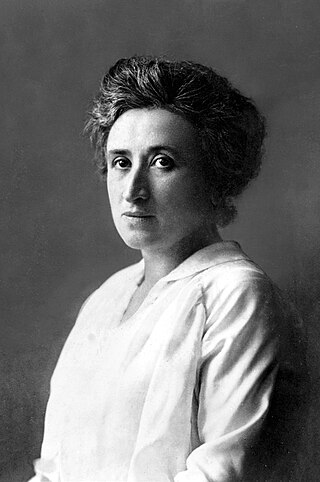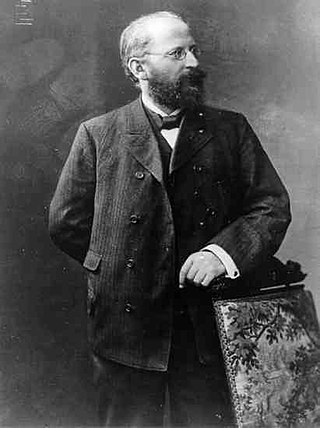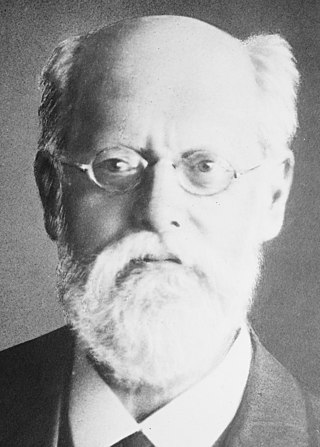Socialism is an economic and political philosophy encompassing diverse economic and social systems characterised by social ownership of the means of production, as opposed to private ownership. It describes the economic, political, and social theories and movements associated with the implementation of such systems. Social ownership can take various forms including: public, community, collective, cooperative, or employee. No single definition encapsulates the many types of socialism, but social ownership is the common element. Traditionally, socialism is on the left-wing of the political spectrum. Types of socialism vary based on the role of markets and planning in resource allocation, the structure of management in organizations, and different approaches from below or from above. Some socialists favour a party, state, or technocratic-driven approach, while others disagree on whether government is the correct vehicle for change.

Rosa Luxemburg was a Polish and naturalised-German revolutionary socialist, orthodox Marxist, and anti-war activist. She became a key figure of the revolutionary socialist movements of Poland and Germany during the late 19th and early 20th century.

Eduard Bernstein was a German social democratic Marxist theorist and politician. A member of the Social Democratic Party of Germany (SPD), Bernstein had held close association to Karl Marx and Friedrich Engels, but he began to identify what he believed to be errors in Marxist thinking and began to criticize views held by Marxism when he investigated and challenged the Marxist materialist theory of history. He rejected significant parts of Marxist theory that were based upon Hegelian metaphysics and rejected the Hegelian perspective of an immanent economic necessity to socialism.
Social Reform or Revolution? is an 1899 pamphlet by Polish-German Marxist theorist Rosa Luxemburg. Luxemburg argues that trade unions, reformist political parties and the expansion of social democracy—while important to the proletariat's development of class consciousness—cannot create a socialist society as Eduard Bernstein, among others, argued. Instead, she argues from a historical materialist perspective that capitalism is economically unsustainable and will eventually collapse and that a revolution is necessary to transform capitalism into socialism. The pamphlet was heavily influential in revolutionary socialist circles and along with Luxemburg's other work an important precursor to left communist theory.
The Godesberg Program of the Social Democratic Party of Germany (SPD) was ratified in 1959 at a convention in the town of Bad Godesberg near Bonn. It represented a fundamental change in the orientation and goals of the SPD, rejecting the aim of replacing capitalism while adopting a commitment to reform capitalism and a mass party orientation that appealed to ethical rather than class-based considerations. It also rejected nationalization as a major principle of socialism.
Social democracy is a political, social, and economic philosophy within socialism that supports political and economic democracy and supports a gradualist, reformist and democratic approach towards achieving socialism, usually under a social liberal framework. In practice, social democracy takes a form of socially managed welfare capitalism, achieved with partial public ownership, economic interventionism, and policies promoting social equality.
Marxism is a method of socioeconomic analysis that originates in the works of 19th century German philosophers Karl Marx and Friedrich Engels. Marxism analyzes and critiques the development of class society and especially of capitalism as well as the role of class struggles in systemic, economic, social and political change. It frames capitalism through a paradigm of exploitation and analyzes class relations and social conflict using a materialist interpretation of historical development – materialist in the sense that the politics and ideas of an epoch are determined by the way in which material production is carried on.
Democratic socialism is a left-wing set of political philosophies that supports political democracy and some form of a socially owned economy, with a particular emphasis on economic democracy, workplace democracy, and workers' self-management within a market socialist, decentralised planned, or democratic centrally planned socialist economy. Democratic socialists argue that capitalism is inherently incompatible with the values of freedom, equality, and solidarity and that these ideals can only be achieved through the realisation of a socialist society. Although most democratic socialists seek a gradual transition to socialism, democratic socialism can support revolutionary or reformist politics to establish socialism. Democratic socialism was popularised by socialists who opposed the backsliding towards a one-party state in the Soviet Union and other nations during the 20th century.
Revisionism represents various ideas, principles, and theories that are based on a revision of Marxism. According to their critics, this involves a significant revision of fundamental Marxist theories and premises, and usually involves making an alliance with the bourgeois class. Some academic economists have used revisionism to describe post-Stalin, Eastern European writers who criticized one-party rule and argued in favour of freedom of the press and of the arts, intra- and sometimes inter-party democracy, independent labor unions, the abolition of bureaucratic privileges, and the subordination of police to the judiciary.
State socialism is a political and economic ideology within the socialist movement that advocates state ownership of the means of production. This is intended either as a temporary measure, or as a characteristic of socialism in the transition from the capitalist to the socialist mode of production or to a communist society. State socialism was first theorised by Ferdinand Lassalle. It advocates a planned economy controlled by the state in which all industries and natural resources are state-owned.
Impossibilism is a Marxist theory that stresses the limited value of political, economic, and social reforms under capitalism. As a doctrine, impossibilism views the pursuit of such reforms as counterproductive to the goal of achieving socialism as they stabilize, and therefore strengthen, support for capitalism. Impossibilism holds that reforms to capitalism are irrelevant or outright counter-productive to the goal of achieving socialism and should not be a major focus of socialist politics.
Revolutionary socialism is a political philosophy, doctrine, and tradition within socialism that stresses the idea that a social revolution is necessary to bring about structural changes in society. More specifically, it is the view that revolution is a necessary precondition for transitioning from a capitalist to a socialist mode of production. Revolution is not necessarily defined as a violent insurrection; it is defined as a seizure of political power by mass movements of the working class so that the state is directly controlled or abolished by the working class as opposed to the capitalist class and its interests.
In Marxist philosophy, the dictatorship of the proletariat is a condition in which the proletariat holds state power. The dictatorship of the proletariat is the intermediate stage between a capitalist economy and a communist economy, whereby the post-revolutionary state seizes the means of production, compels the implementation of direct elections on behalf of and within the confines of the ruling proletarian state party, and institutes elected delegates into representative workers' councils that nationalise ownership of the means of production from private to collective ownership. During this phase, the administrative organizational structure of the party is to be largely determined by the need for it to govern firmly and wield state power to prevent counterrevolution and to facilitate the transition to a lasting communist society.
The World Socialist Movement (WSM) is an international organisation of socialist parties created in 1904 with the founding of the Socialist Party of Great Britain (SPGB).
Orthodox Marxism is the body of Marxist thought which emerged after the death of Karl Marx and Friedrich Engels in the late 19th century, expressed in its primary form by Karl Kautsky. Kautsky's views of Marxism dominated the European Marxist movement for two decades, and orthodox Marxism was the official philosophy of the majority of the socialist movement as represented in the Second International until the First World War in 1914, whose outbreak caused Kautsky's influence to wane and brought to prominence the orthodoxy of Vladimir Lenin. Orthodox Marxism aimed to simplify, codify and systematize Marxist method and theory by clarifying perceived ambiguities and contradictions in classical Marxism. It overlaps significantly with Instrumental Marxism.
Ethical socialism is a political philosophy that appeals to socialism on ethical and moral grounds as opposed to consumeristic, economic, and egoistic grounds. It emphasizes the need for a morally conscious economy based upon the principles of altruism, cooperation, and social justice while opposing possessive individualism.

The Spartacus League was a Marxist revolutionary movement organized in Germany during World War I. It was founded in August 1914 as the International Group by Rosa Luxemburg, Karl Liebknecht, Clara Zetkin, and other members of the Social Democratic Party of Germany (SPD) who were dissatisfied with the party's official policies in support of the war. In 1916 it renamed itself the Spartacus Group and in 1917 joined the Independent Social Democratic Party of Germany (USPD), which had split off from the SPD as its left wing faction. During the November Revolution of 1918 that broke out across Germany at the end of the war, the Spartacus Group re-established itself as a nationwide, non-party organization called the "Spartacus League" with the goal of instituting a soviet republic that would include all of Germany. It became part of the Communist Party of Germany (KPD) when it was formed on 1 January 1919 and at that point ceased to exist as a separate entity.

Karl Johann Kautsky was a Czech-Austrian philosopher, journalist, and Marxist theorist. A leading theorist of the Social Democratic Party of Germany (SPD) and the Second International, Kautsky advocated orthodox Marxism, which emphasized the scientific, materialist, and determinist character of Karl Marx's work. This interpretation dominated European Marxism for two decades, from the death of Friedrich Engels in 1895 to the outbreak of World War I in 1914.
Social democracy originated as an ideology within the labour whose goals have been a social revolution to move away from purely laissez-faire capitalism to a social capitalism model sometimes called a social market economy. In a nonviolent revolution as in the case of evolutionary socialism, or the establishment and support of a welfare state. Its origins lie in the 1860s as a revolutionary socialism associated with orthodox Marxism. Starting in the 1890s, there was a dispute between committed revolutionary social democrats such as Rosa Luxemburg and reformist social democrats. The latter sided with Marxist revisionists such as Eduard Bernstein, who supported a more gradual approach grounded in liberal democracy and cross-class cooperation. Karl Kautsky represented a centrist position. By the 1920s, social democracy became the dominant political tendency, along with communism, within the international socialist movement, representing a form of democratic socialism with the aim of achieving socialism peacefully. By the 1910s, social democracy had spread worldwide and transitioned towards advocating an evolutionary change from capitalism to socialism using established political processes such as the parliament. In the late 1910s, socialist parties committed to revolutionary socialism renamed themselves as communist parties, causing a split in the socialist movement between these supporting the October Revolution and those opposing it. Social democrats who were opposed to the Bolsheviks later renamed themselves as democratic socialists in order to highlight their differences from communists and later in the 1920s from Marxist–Leninists, disagreeing with the latter on topics such as their opposition to liberal democracy whilst sharing common ideological roots.
The Socialist Crisis in France is a work by Rosa Luxemburg that first appeared in 5 instalments in Die Neue Zeit in 1900/1901. It addressed the question of whether communists should participate in bourgeois governments.





